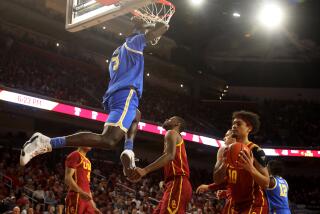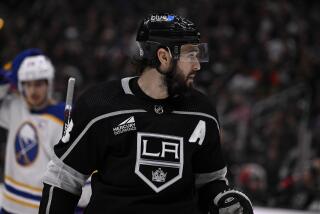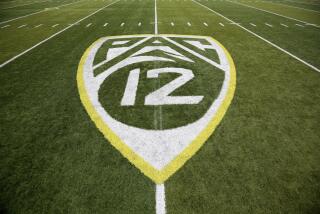Fear Never Chills Out in the Goal
There are some things I never would have wanted to be: 1) a member of a bomb squad, 2) a guy who caps oil well fires, 3) captain of a U-boat, 4) Gen. Custer, 5) Liz Taylor’s husband, 6) Mike Tyson’s opponent, 7) a Communist, 8) a Nazi, 9) the guy who shot Jesse James, 10) a screw in a maximum-security prison, 11) a guy who squealed on the Mafia.
But, on balance, I would prefer one or two of them (defusing bombs?) to being a goalie in the NHL.
That’s not a job, it’s a sentence.
How would you like to stand there night after night in a phantom-of-the-opera mask, on skates but unable to skate, keeping your eyes strained for a lethal weapon, a piece of hard rubber about the weight and density of a small cannonball that you’re expected to stop, even if it means with your face and even though it may be flying at you at 100 m.p.h.?
It’s one of the loneliest jobs in the world. Your mates are out there having a swell time, flying around on the ice, crashing into each other and the boards, having fun, getting their aggressions out, swivel-hipping through back-checkers, getting to wave their sticks in the air as they score. And every minute and a half, they get a breather and a new line comes in to relieve them.
You, meanwhile, simply stand there, trying not to wobble on your skates, scanning the field tensely for the telltale breakaway by the enemy.
Have you ever tried to stand on skates two or three hours a night?
It’s solitary confinement. On ice. Forest rangers are social animals by comparison. If a goal is scored, it’s your fault. You wonder why goaltenders simply don’t join the Foreign Legion in the first place.
Goalies are often big customers of psychiatrists. Spending your life in the crease on a hockey rink is the athletic equivalent of spending it in a haunted house with demented relatives locked in the attic and wolves howling outside. Sooner or later, you crack. You begin to think it’s raining pucks and you’re standing in it.
Kelly Hrudey is a goaltender, one of the best. He stands every night in a shower of shots for the Kings. His sanity is at stake, to say nothing of his eyes and teeth.
You have heard of the show business expression flop sweat? It is aggravated fear of failure. It goes stage fright one better. The curtains part and you suddenly wish you had taken up selling encyclopedias for a living.
Hrudey knows this feeling well. Before a game--or, at least, most games--he says, he “gets this petrified feeling,” almost as if he couldn’t go out there.
Shakespearean actors get it, operatic divas get it, ballerinas are sometimes found crouched in a corner of a dressing room and have to be coaxed on stage, sobbing.
Hrudey’s nightmare is, he will go out onto the ice, the defense will collapse in front of him, goals will fly through the net like popping corn and he will be summarily pulled from the game in mid-period.
It happens.
“That 100-foot skate to the bench after you have been pulled is the longest, slowest skate in the world,” Hrudey says ruefully . “It seems five miles.”
It might be the longest skate a goalie makes. The rest of the night he is penned in a block of the ice six feet wide and is asked to protect a cage four feet high and three feet deep. In front of this is the “crease,” a semi-circular no-man’s-land where life suddenly becomes a crowded elevator with 10 guys trying to kick, hit or carom the puck past you.
A goalie paces this area like a caged lion most of the night. He is not a player, he is a target.
In the super-macho world of hockey, goaltenders did not even wear masks till 1959. Jacques Plante, who already had a 200-stitch face, had twice fractured his skull and had broken his cheekbones so often that his face looked like a custard pie, designed a face mask but was forbidden to use it.
Then, one night, a slap shot made his face resemble a broken jar. When they stopped the bleeding, Plante refused to go back to the crease until they let him wear his homemade mask. Even then, some traditionalists, notably Gump Worsley, rejected it as cowardly.
Hrudey wears a mask, all right. And contact lenses. And a feeling of sheer terror.
Hrudey wouldn’t go out there without any of them.
Going to work scared is not unique to hockey players or thespians. Accountants, sales clerks, even journalists know the feeling well. But, for goaltenders in the line of fire, it is a must, Hrudey says. “I like it,” he says. “That horrified feeling is a good sign for me. It means I’m ready. It guarantees performance. You anticipate rather than guess. You concentrate better on the angles. I play best when I’m emotional.”
A frightened animal has all his senses working.
The other night, at the Forum, this petrified forest turned back 37 shots by the New York Rangers. Only one got past as the Kings scored a badly needed victory, 6-1. An early 4-0 lead by his team helped Hrudey.
“The other team takes lower percentage shots when they fall that far behind,” he says.
But he once stopped 73 of 75 shots in an overtime game against Washington when he was a New York Islander.
Why become a goalie at all when such comparatively safe professions as bank robber and Channel swimmer are open? “I became a goalie when I was 5 or 6, I think. The pucks all hit me. Instead of going in.”
It’s proof positive that you are meant to be a goaltender when you let them throw six-ounce hunks of hard rubber at you at ballistic speed and you don’t go hide the next time the kids come around with skates tied over their shoulders.
Goaltenders are often the great eccentrics of our time. But Hrudey has his feet solidly on the ice. He has the mental health to go into combat petrified. The day he goes in there singing and laughing without a lump in his throat is the day they will put a net over him.
More to Read
Go beyond the scoreboard
Get the latest on L.A.'s teams in the daily Sports Report newsletter.
You may occasionally receive promotional content from the Los Angeles Times.






